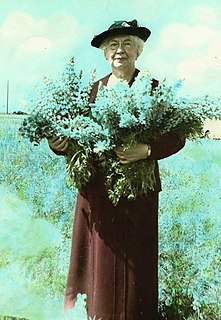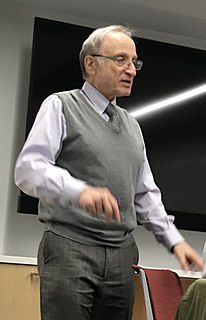A Quote by Seneca the Younger
We ought not to confine ourselves either to writing or to reading; the one, continuous writing, will cast a gloom over our strength, and exhaust it; the other will make our strength flabby and watery. It is better to have recourse to them alternately, and to blend one with the other, so that the fruits of one's reading may be reduced to concrete form by the pen.
Related Quotes
As the strongest faith may be shaken, so the weakest, where truth is, is so far rooted that it will prevail. Weakness with watchfulness will stand, when strength with too much confidence fails. Weakness, with acknowledgement of it, is the fittest seat and subject for God to perfect His strength in; for consciousness of our infirmities drives us out of ourselves to Him in whom our strength lies.
We may seem the weakest and most insignificant of all the Realms, but our strength comes in other ways. We have what no other race has: imagination. Any one of us, even the lowliest, can create worlds within ourselves; we can people them with the most extraordinary creatures, the most amazing inventions, the most incredible things. We can live in those worlds ourselves, if we choose; and in our own worlds, we can be as we want to be. Imagination is as close as we will ever be to godhead, Poison, for in imagination, we can create wonders.
Confronting our feelings and giving them appropriate expression always takes strength, not weakness. It takes strength to acknowledge our anger, and sometimes more strength yet to curb the aggressive urges anger may bring and to channel them into nonviolent outlets. It takes strength to face our sadness and to grieve and to let our grief and our anger flow in tears when they need to. It takes strength to talk about our feelings and to reach out for help and comfort when we need it.
I had many reasons for writing this book but among them was the hope that every Latino child and adult would find something familiar in it. And my hope is that when they finish reading the book, that they will come away with a renewed sense of pride in our culture and in who we are. We get a lot of strength from that [culture and identity] and we should be proud of it.
Pace yourself in your reading. A little bit every day really adds up. If you read during sporadic reading jags, the fits and starts will not get you anywhere close to the amount of reading you will need to do. It is far better to walk a mile a day than to run five miles every other month. Make time for reading, and make a daily habit of it, even if it is a relatively small daily habit.
You in the unions do not yet represent all of labor. But I hope some day you will, because I believe that it is through strength, through the fact that people who know what people need are working to make this country a better place for all people, that we will help the world to accept our leadership and understand that, under our form of government and through our way of life, we have something to offer them.
Some may say [journal keeping] is a great deal of trouble. But we should not call anything trouble which brings to pass good. I consider that portion of my life which has been spent in keeping journals and writing history to have been very profitably spent. - "If there was no other motive in view [except] to have the privilege of reading over our journals and for our children to read, it would pay for the time spent in writing it.
I am not ashamed to use the word class. I will also plead guilty to another charge. The charge is that people belonging to my class think they're better than other people. You're damn right we're better. We're better because we do not shirk our obligations either to ourselves or to others. . . .we live by our lights, we die by our lights, and whoever the high gods may be, we'll look them in the eye without apology.
If we took just 5 minutes to recognize each other's beauty, instead of attacking each other for our differences. That's not hard. It's really an easier and better way to live. And ultimately, it saves lives. Then again, it's not easy at all. It can be the hardest thing, because loving other people starts with loving ourselves and accepting ourselves. I know many of you have struggled with this. I draw upon your strength and your support, and have, in ways you will never know.
God has so ordered, that in pressing on in duty we shall find the truest, richest comfort for ourselves. Sitting down to brood over our sorrows, the darkness deepens about us and creeps into our heart, and our strength changes to weakness. But, if we turn away from the gloom, and take up the tasks and duties to which God calls us, the light will come again, and we shall grow stronger.
Women will not advance except by joining together in cooperative action.... Unlike other groups, women do not need to set affiliation and strength in opposition one against the other. We can readily integrate the two, search for more and better ways to use affiliation to enhance strength--and strength to enhance affiliation.
I don't want the words to be naked the way they are in faxes or in the computer. I want them to be covered by an envelope that you have to rip open in order to get at. I want there to be a waiting time -a pause between the writing and the reading. I want us to be careful about what we say to each other. I want the miles between us to be real and long. This will be our law -that we write our dailiness and our suffering very, very carefully.
Anatole France frankly advised, "When a thing has been said and said well, have no scruple. Take it and copy it." Yes, indeed, but do more. Copy many well-said things. Pierce them together. Assimilate them. Make the process of reading them a way to form the mind and shape the soul. As anthologies can never be complete, we will never exhaust the ways quotations can enrich our lives.








































